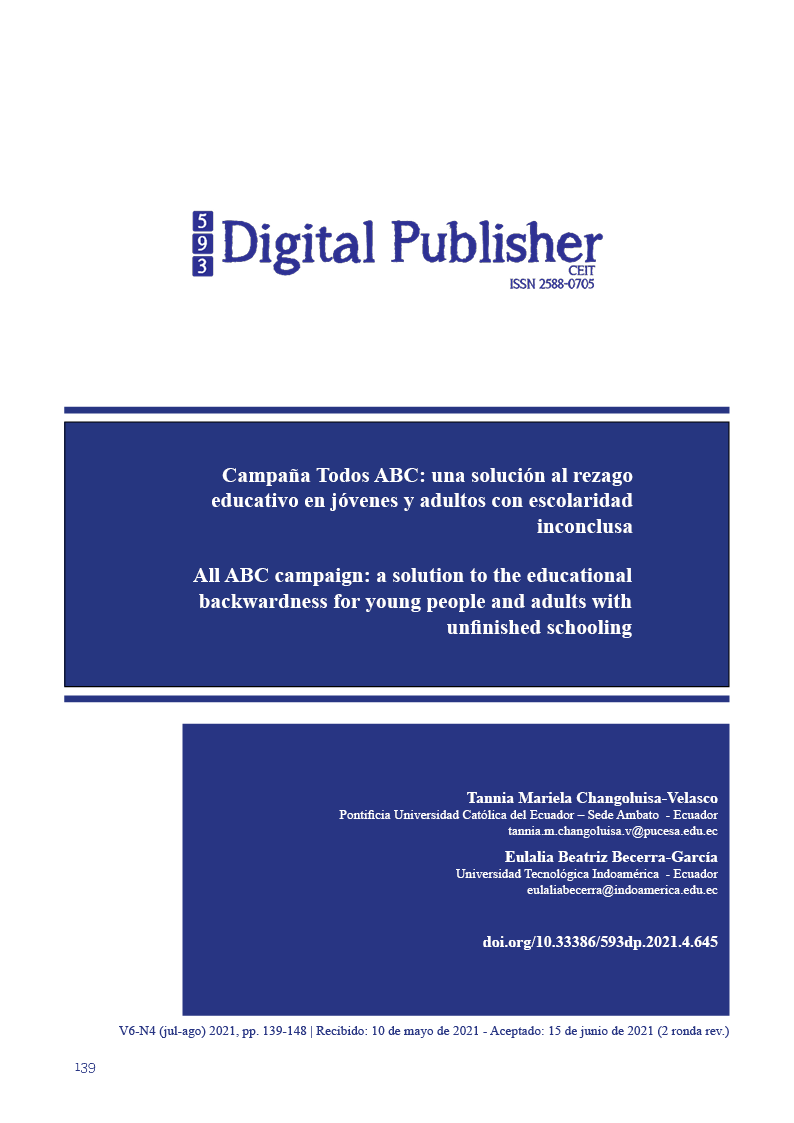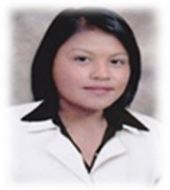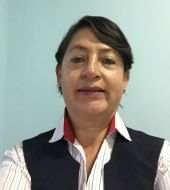All ABC campaign: a solution to the educational backwardness for young people and adults with unfinished schooling
Main Article Content
Abstract
Education is a right of people throughout their lives, which is why the Ministry of Education has implemented several study projects over the years, such as the EBJA Project (Educación Básica para Jóvenes y Adultos) and within this, the Campaign called "Todos ABC", which seeks to eradicate pure, functional and digital illiteracy, and support the processes of post-literacy (2do EGB a 7mo EGB) and continuing education for adults, and the overcoming of educational backwardness. The study on "La Campaña Todos ABC": a solution to educational backwardness for young people and adults with unfinished schooling aims to analyze the factors that led students to drop out of the classroom, and to motivate them to improve themselves through this type of program so that they can return to complete their studies, whether at the elementary or high school level. The methodological approach of the mixed research allowed to explore, describe, understand and interpret the information that was collected through the survey that was applied to the actors or stakeholders of Zone 3 located in the Province of Cotopaxi. The results obtained were positive, an integral formation is being achieved in the participants that complies with the educational axes of learning to learn (Cognitive), learning to do (Procedural), learning to be (Attitudinal); in relation to the conclusions it can be indicated that the students have overcome the adversities of geographical location, unemployment, economic instability and have enrolled in the Campaign and are on track to successfully complete their studies that they resumed after having abandoned it for several years.
Downloads
Article Details

This work is licensed under a Creative Commons Attribution-NonCommercial-ShareAlike 4.0 International License.
1. Derechos de autor
Las obras que se publican en 593 Digital Publisher CEIT están sujetas a los siguientes términos:
1.1. 593 Digital Publisher CEIT, conserva los derechos patrimoniales (copyright) de las obras publicadas, favorece y permite la reutilización de las mismas bajo la licencia Licencia Creative Commons 4.0 de Reconocimiento-NoComercial-CompartirIgual 4.0, por lo cual se pueden copiar, usar, difundir, transmitir y exponer públicamente, siempre que:
1.1.a. Se cite la autoría y fuente original de su publicación (revista, editorial, URL).
1.1.b. No se usen para fines comerciales u onerosos.
1.1.c. Se mencione la existencia y especificaciones de esta licencia de uso.
References
Constitución de la República del Ecuador, Registro Oficial 449, 20X2008.
De Oña Cots, J. M., García Gálvez, E. A., & Colomo Magaña, E. (2018). Educación de adultos e inclusión social. Experiencias y opiniones de un grupo de estudiantes. Revista Internacional de Educación para la Justicia Social (RIEJS), 10-15.
Espinoza, Loyola, Castillo & González. (2002). La deserción escolar en América Latina: un tema prioritario para la agenda regional. Revista Iberoamericana de educación, 39 - 62.
Fernández Roman, J. E. (2014). Educación y Psicología en el Siglo XXI. Educación XX1, 4, 13.
Foley. (2020). Understanding adult education and training. Routledge., s/n.
Garcia, Casal, Merino, & Sánchez. (2013). Itinerarios de abandono escolar y transiciones tras la enseñanza secundaria obligatoria. Revista de educación, 361.
Hernández. (2015). Educación: Una visión desde la dimensión del ser humano. Acta academica, 79 -92.
Ineval. (2013). TERCE . Tercer estudio regional comparativo y explicativo. Ecuador mejora sus resul-tados. Quito: Ministerio.
Letelier, M. E. (2009). La evaluación de aprendizajes de personas jóvenes y adultas. Revista Iberoamericana de Evaluación Educativa, 7.
Ludojoski, R. L. (1986). Andragogía. Educación del Adulto (4ta ed.). Buenos Aires, Argentina: Guadalupe.
Martínez. (2015). . La educación secundaria para adultos y la FP de grado medio: ¿una segunda opor-tunidad en tiempos de crisis? Revista de la asociación de de Sociología de la Educación, 28 - 43.
Mendoza & Zuñiga. (2017). Factores intra y extra escolares asociados al rezago educativo en comunidades vulnerables. Revista de Educación, 80.
Ministerio de Educación. (2014). Acuerdo Nro. MINE-DUC-ME-2014-00065-A. Quito: Me.
Ministerio de Educación. (2017). ACUERDO Nro. MINEDUC-MINEDUC-2017-00067-A. QUITO: RO.
Ministerio de Educación. (2018). Todos somos ABC. Quito: ME.
Ministerio de Educación. (2020b). acerca de las ofertas Todos ABC. Quito: ME. Obtenido de https://educacion.gob.ec/ofertas-todos-abc
Moretin, Ballesteros & Mateus. (2020). ¿Igualidad de oportunidades? Más que el mero acceso: narrativas de jóvenes con trayectorias de fracaso y abandono temprano de la educación en España y Portugal. Fuentes, 143 - 159.
Núñez Barboza, M. (2005). El rezago educativo en México: dimensiones de un enemigo silencioso y modelo propuesto para entender las causas de su propagación. Revista Interamericana de Educación de Adultos, 29-70. Obtenido de https://www.redalyc.org/pdf/4575/457545128002.pdf
Salinas & Negri. (2020). ¿Por qué volver a la escuela? Un estudio de caso sobre una institución de Educación de Adultos en Cuenca, Ecuador. IJNE, 42-43.
Sánchez, D. (2015). La tendencia del abandono escolar en Ecuador: período 1994-2014. valor agregado, 39 -66.
UNESCO. (2005). Analfabetismo y alfabetización en el Ecuador. Opciones para la política y la práctica. Ecuador: Ministerio de Educación.
UNESCO. (2005). La educación de jovenes y adultos en América Latina y el Caribe hacia un estado de arte. Santiago de Chile: trinco S.A.



